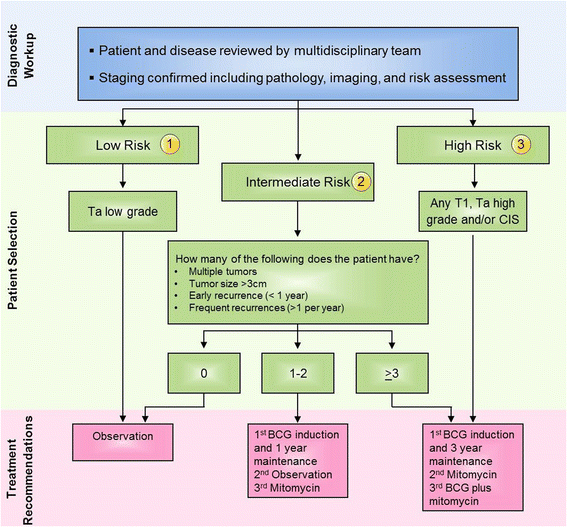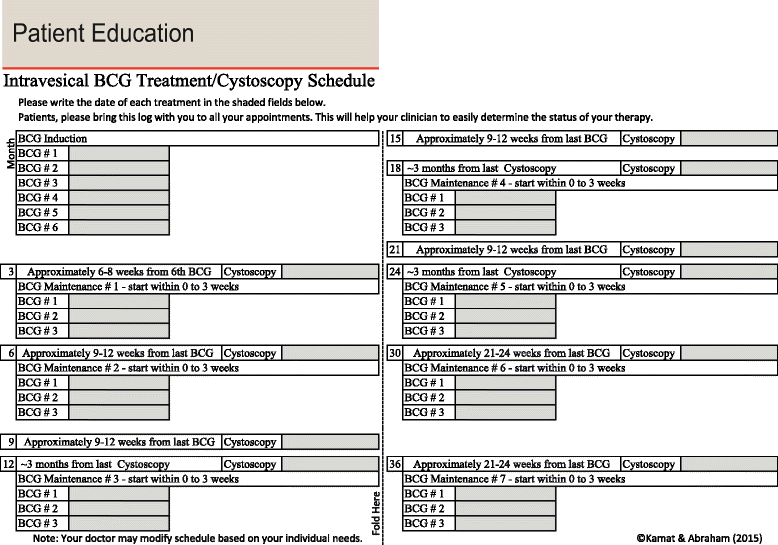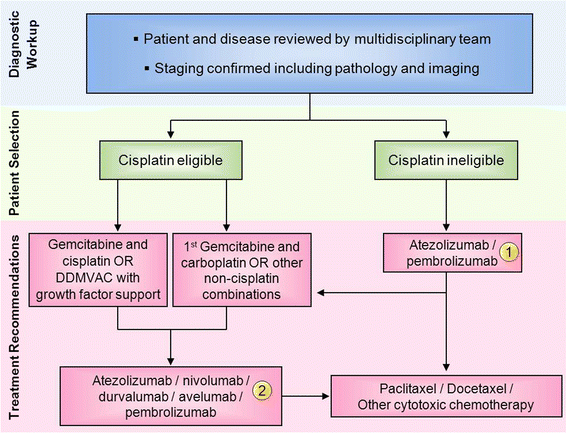Society for Immunotherapy of Cancer consensus statement on immunotherapy for the treatment of bladder carcinoma
- PMID: 28807024
- PMCID: PMC5557323
- DOI: 10.1186/s40425-017-0271-0
Society for Immunotherapy of Cancer consensus statement on immunotherapy for the treatment of bladder carcinoma
Erratum in
-
Erratum to: Society for Immunotherapy of Cancer consensus statement on immunotherapy for the treatment of bladder carcinoma.J Immunother Cancer. 2017 Sep 28;5(1):80. doi: 10.1186/s40425-017-0280-z. J Immunother Cancer. 2017. PMID: 28962591 Free PMC article. No abstract available.
Abstract
The standard of care for most patients with non-muscle-invasive bladder cancer (NMIBC) is immunotherapy with intravesical Bacillus Calmette-Guérin (BCG), which activates the immune system to recognize and destroy malignant cells and has demonstrated durable clinical benefit. Urologic best-practice guidelines and consensus reports have been developed and strengthened based on data on the timing, dose, and duration of therapy from randomized clinical trials, as well as by critical evaluation of criteria for progression. However, these reports have not penetrated the community, and many patients do not receive appropriate therapy. Additionally, several immune checkpoint inhibitors have recently been approved for treatment of metastatic disease. The approval of immune checkpoint blockade for patients with platinum-resistant or -ineligible metastatic bladder cancer has led to considerations of expanded use for both advanced and, potentially, localized disease. To address these issues and others surrounding the appropriate use of immunotherapy for the treatment of bladder cancer, the Society for Immunotherapy of Cancer (SITC) convened a Task Force of experts, including physicians, patient advocates, and nurses, to address issues related to patient selection, toxicity management, clinical endpoints, as well as the combination and sequencing of therapies. Following the standard approach established by the Society for other cancers, a systematic literature review and analysis of data, combined with consensus voting was used to generate guidelines. Here, we provide a consensus statement for the use of immunotherapy in patients with bladder cancer, with plans to update these recommendations as the field progresses.
Keywords: Bladder cancer; Consensus statement; Guidelines; Immunotherapy.
Conflict of interest statement
Ethics approval and consent to participate
Not applicable.
Consent for publication
Not applicable.
Competing interests
AMK has received research support from NCI, FKD Industries, Photocure, Merck, and Heat Biologics. In addition, he has served on advisory boards or review panels for Photocure, Sanofi, Merck, Abbot Molecular, Theralase, Heat Biologics, Spectrum Pharmaceuticals, Pacific Edge, Astra Zeneca, Genentech, Pfizer and Oncogenix. JB has served as a consultant or on advisory boards for Genentech (Roche), Pfizer, and AstraZeneca. MDG has served on advisory boards for Genentech (Roche), EMD Serono, AstraZeneca, and Astellas. BRK has received research support from Spectrum Pharmaceticals, Genomic Health, Photocure, Heat Biologics, and FKD Industries. MIM has received research support from Mirati Therapeutics, Pfizer, Cerulean Pharma, Merck, Seattle Genetics, Acerta Pharma, BioClin Therapeutics, Genentech (Roche), Bristol-Myers Squibb, X4 Pharma, MedImmune, Incyte, Innocrin Pharma, and Inovio Pharmaceuticals. MAO has served on advisory boards for Genentech (Roche), AstraZeneca, Inovio Pharmaceuticals, and Novartis. PHO has participated on advisory boards or has acted as a consultant to Bayer, Bellicum, Dendreon, Sanofi Aventis, Medivation, Pfizer, Roche Laboratories, Ferring, Johnson and Johnson, Exelixis, and Millennium. He has also received research support from Oncogenix, Progenics, Johnson and Johnson, Merck, Millennium, Dendreon, Sanofi Aventis, Eli Lilly, and Roche Laboratories and owns stock in Bellicum Pharmaceuticals and Tyme Technologies. PS has acted as a consultant to or on an advisory board for Bristol-Myers Squibb, Glaxo-Kline Smith, AstraZeneca, Amgen, Constellation, Jounce, Kite Pharma, Evelo, Neon, and EMD Serono and owns stock in Jounce, Kite Pharma, Evelo, Neon, and Constellation. Her spouse also owns patents licensed to Jounce, Merck, and Bristol-Myers Squibb. GS has acted as a consultant to Bayer, Sanofi, Pfizer, Novartis, Eisai, Janssen, Amgen, Astrazeneca, Merck, Genentech (Roche), Argos, and Agensys, and he has participated as a speaker for Clinical Care Options and has acted as an author for UpToDate. In addition, he has received research support from Bayer, Onyz, Celgene, Boehringer Ingelheim, and Merck. JER has acted as a consultant to Merck, Bristol-Myers Squibb, Eli Lilly, Agensys, Genentech (Roche), Sanofi, EMD Serono, AstraZeneca, Innovio, Seattle Genetics, Oncogenex, and Bayer. In addition, he also owns stock in Merck and Illumina. DLL, JAT, PA, CTL, and ES declare that they have no competing interests to disclose.
Publisher’s Note
Springer Nature remains neutral with regard to jurisdictional claims in published maps and institutional affiliations.
Figures



Similar articles
-
Expert consensus document: Consensus statement on best practice management regarding the use of intravesical immunotherapy with BCG for bladder cancer.Nat Rev Urol. 2015 Apr;12(4):225-35. doi: 10.1038/nrurol.2015.58. Epub 2015 Mar 24. Nat Rev Urol. 2015. PMID: 25800393 Review.
-
Interferon alfa in the treatment paradigm for non-muscle-invasive bladder cancer.Urol Oncol. 2014 Jan;32(1):35.e21-30. doi: 10.1016/j.urolonc.2013.02.010. Epub 2013 Apr 28. Urol Oncol. 2014. PMID: 23628309 Review.
-
Immune therapies in non-muscle invasive bladder cancer.Curr Treat Options Oncol. 2015 Feb;16(2):5. doi: 10.1007/s11864-014-0315-3. Curr Treat Options Oncol. 2015. PMID: 25757877 Review.
-
Bacillus Calmette-Guérin immunotherapy for genitourinary cancer.BJU Int. 2013 Aug;112(3):288-97. doi: 10.1111/j.1464-410X.2012.11754.x. Epub 2013 Mar 20. BJU Int. 2013. PMID: 23517232 Review.
-
Intravesical bacillus Calmette-Guérin instillation in non-muscle-invasive bladder cancer: A review.Int J Urol. 2018 Jan;25(1):18-24. doi: 10.1111/iju.13410. Epub 2017 Jul 25. Int J Urol. 2018. PMID: 28741703 Review.
Cited by
-
Integrating oxidative-stress biomarkers into a precision oncology risk-stratification model for bladder cancer prognosis and therapy.Front Cell Dev Biol. 2024 Sep 16;12:1453448. doi: 10.3389/fcell.2024.1453448. eCollection 2024. Front Cell Dev Biol. 2024. PMID: 39351147 Free PMC article.
-
Vaccines and Dementia: Part II. Efficacy of BCG and Other Vaccines Against Dementia.J Alzheimers Dis. 2024;98(2):361-372. doi: 10.3233/JAD-231323. J Alzheimers Dis. 2024. PMID: 38393913 Free PMC article. Review.
-
Research progress in the off-target effects of Bacille Calmette-Guérin vaccine.Chin Med J (Engl). 2024 Sep 5;137(17):2065-2074. doi: 10.1097/CM9.0000000000002890. Epub 2023 Dec 13. Chin Med J (Engl). 2024. PMID: 38092722 Free PMC article. Review.
-
Development of an Anti-canine PD-L1 Antibody and Caninized PD-L1 Mouse Model as Translational Research Tools for the Study of Immunotherapy in Humans.Cancer Res Commun. 2023 May 15;3(5):860-873. doi: 10.1158/2767-9764.CRC-22-0468. eCollection 2023 May. Cancer Res Commun. 2023. PMID: 37377896 Free PMC article.
-
Prevalence of immune-related adverse events and anti-tumor efficacy in advanced/metastatic urothelial carcinoma following immune-checkpoint inhibitor treatment.Clin Transl Oncol. 2023 Dec;25(12):3556-3564. doi: 10.1007/s12094-023-03213-6. Epub 2023 May 22. Clin Transl Oncol. 2023. PMID: 37217634
References
-
- SEER Cancer Statistics Review (CSR) 1975-2014. 2017; Available from: https://seer.cancer.gov/csr/1975_2014/. [cited 2017 June 13, 2017]
-
- Chen DS, Mellman I. Elements of cancer immunity and the cancer-immune set point. Nature. 2017;541(7637):321–330. - PubMed
-
- Ho PL, Williams SB, Kamat AM. Immune therapies in non-muscle invasive bladder cancer. Curr Treat Options in Oncol. 2015;16(2):5. - PubMed
-
- Siegel RL, Miller KD, Jemal A. Cancer statistics, 2016. CA Cancer J Clin. 2016;66(1):7–30. - PubMed
-
- Lamm DL, et al. Bacillus Calmette-Guerin immunotherapy of superficial bladder cancer. J Urol. 1980;124(1):38–40. - PubMed
Publication types
MeSH terms
Substances
Grants and funding
LinkOut - more resources
Full Text Sources
Other Literature Sources
Medical
